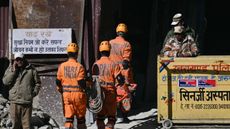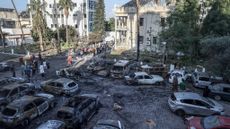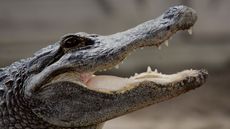Six-decade-old mystery of skiers found dead in underwear is solved
Theories of what killed ‘Dyatlov Pass’ group during Siberia trek ranged from aliens to secret arms tests

The deaths of nine Russian skiers in a mystery that baffled investigators and inspired suspicions of paranormal activity have finally been explained after 61 years.
The group of students disappeared after setting out in January 1959 for a 220-mile ski trek across the Ural Mountains to Mount Otorten - translated in the local Mansi language as “don’t go there”.
Rescuers discovered the frozen bodies of two members of the group, led by 23-year-old engineering student Igor Dyatlov, beside the remains of a fire close to their camp at the foot of Kholat Syakhl, or “Dead Mountain”. Both victims were “dressed in their underwear despite temperatures as low as minus 40C”, The Times reports.
Subscribe to The Week
Escape your echo chamber. Get the facts behind the news, plus analysis from multiple perspectives.

Sign up for The Week's Free Newsletters
From our morning news briefing to a weekly Good News Newsletter, get the best of The Week delivered directly to your inbox.
From our morning news briefing to a weekly Good News Newsletter, get the best of The Week delivered directly to your inbox.
Another three bodies, “also barefoot and lightly dressed”, were found nearby, and the group’s tent “had been slashed open from the inside”, the paper says.
The remaining bodies were located months later, when the snow began to thaw. Two were missing eyes, one had lost his tongue and three had head wounds that experts concluded were caused by a force equal to that of a car accident or an explosion.
Abnormal levels of radiation were also “detected on some of their clothes”, The Times adds.
The death of what would become known as the Dyatlov Pass group were hushed up until the collapse of the Soviet Union, in 1991 - a cover-up that inspired “decades-long rumours of natural disasters, yetis, and the supernatural”, along with books, documentaries and films about the ill-fated skiing trek, says the Daily Mail.
Some theorists have claimed that aliens were involved, while others have alleged that “the students were killed by a Soviet missile” or that “some of the group had KGB connections and were on a secret mission to meet US agents”, adds The Sun.
Armchair detectives have even suggested that the group, from Ural Polytechnic Institute, may have been driven insane by “infrasound” caused by a “rare wind event”.
But after reopening the case last year, “the Russian prosecutor-general’s office has concluded there was a far more mundane explanation - hypothermia”, The Sun reports. Investigators believe that the hikers froze to death after fleeing from their tent in the night to take cover from an avalanche.
Senior state prosecutor Andrei Kuryakov said that while the students "did everything right”, they were “doomed” after losing sight of their tent.
“Visibility was 16 metres. They lit a fire and then searched for their tent - but it had vanished in the whiteout after the avalanche,” he said. “They had no chance in these circumstances.”
However, the prosecutor’s verdict has been disputed by the families of the victims. Yevgeny Chernusov, a lawyer representing the relatives, said they “categorically” disagree with the findings and believe the students were killed by an explosion caused by a rocket failure.
Create an account with the same email registered to your subscription to unlock access.
Sign up for Today's Best Articles in your inbox
A free daily email with the biggest news stories of the day – and the best features from TheWeek.com
Kari Wilkin is The Week Digital’s global managing editor. She joined the UK site as production editor in 2017, after moving across from The Week magazine. Her career as a journalist began as a sub-editor at newspapers including The Sun, Metro, the Daily Star and News of the World, followed by stints at Elle and Asda Magazine. She also helped to launch the UK edition of Women’s Health magazine, as chief sub-editor with a sideline in writing; has penned travel and lifestyle articles for titles including The Telegraph and The Sun; and is a contributor on “The Week Unwrapped” podcast.
-
 Magazine interactive crossword - May 3, 2024
Magazine interactive crossword - May 3, 2024Puzzles and Quizzes Issue - May 3, 2024
By The Week US Published
-
 Magazine solutions - May 3, 2024
Magazine solutions - May 3, 2024Puzzles and Quizzes Issue - May 3, 2024
By The Week US Published
-
 Magazine printables - May 3, 2024
Magazine printables - May 3, 2024Puzzles and Quizzes Issue - May 3, 2024
By The Week US Published
-
 Puffed rice and yoga: inside the collapsed tunnel where Indian workers await rescue
Puffed rice and yoga: inside the collapsed tunnel where Indian workers await rescueSpeed Read Workers trapped in collapsed tunnel are suffering from dysentery and anxiety over their rescue
By Sorcha Bradley, The Week UK Published
-
 Gaza hospital blast: What the video evidence shows about who's to blame
Gaza hospital blast: What the video evidence shows about who's to blameSpeed Read Nobody wants to take responsibility for the deadly explosion in the courtyard of Gaza's al-Ahli Hospital. Roll the tape.
By Peter Weber, The Week US Published
-
 Giraffe poo seized after woman wanted to use it to make a necklace
Giraffe poo seized after woman wanted to use it to make a necklaceTall Tales And other stories from the stranger side of life
By Chas Newkey-Burden, The Week UK Published
-
 Helicopter sound arouses crocodiles
Helicopter sound arouses crocodilesTall Tales And other stories from the stranger side of life
By Chas Newkey-Burden, The Week UK Published
-
 Woman sues Disney over 'injurious wedgie'
Woman sues Disney over 'injurious wedgie'Tall Tales And other stories from the stranger side of life
By Chas Newkey-Burden, The Week UK Published
-
 Emotional support alligator turned away from baseball stadium
Emotional support alligator turned away from baseball stadiumTall Tales And other stories from the stranger side of life
By Chas Newkey-Burden, The Week UK Published
-
 Europe's oldest shoes found in Spanish caves
Europe's oldest shoes found in Spanish cavesTall Tales And other stories from the stranger side of life
By Chas Newkey-Burden, The Week UK Published
-
 Artworks stolen by Nazis returned to heirs of cabaret performer
Artworks stolen by Nazis returned to heirs of cabaret performerIt wasn't all bad Good news stories from the past seven days
By The Week Staff Published